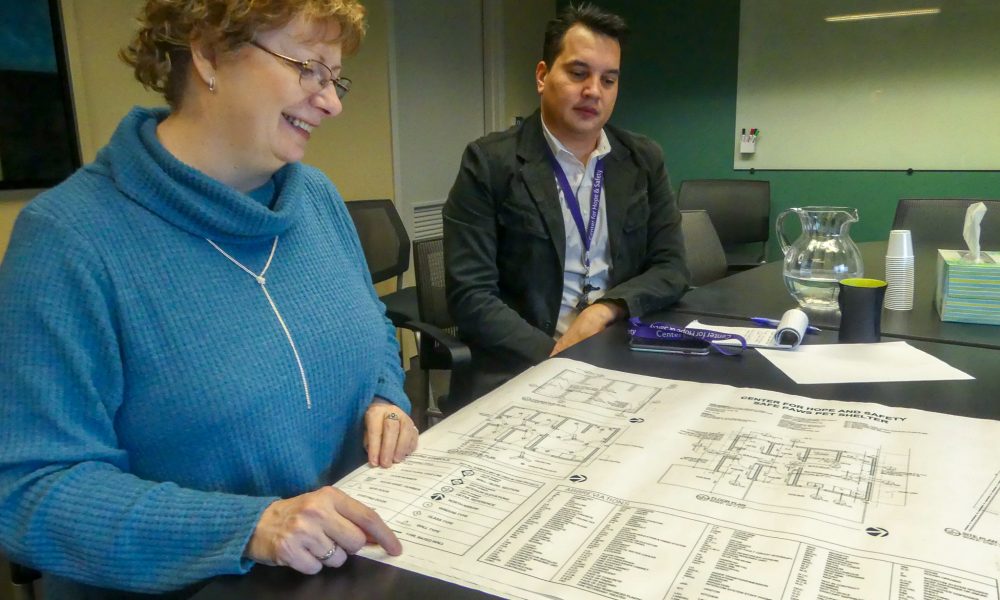
Jayne Downing, left, executive director of the Center for Hope and Safety, and advocate Steven Broncheau, look over plans for the Safe Paws Pet Shelter. (Rachel Alexander/Salem Reporter)
Last year, Jayne Downing fielded a call at her Salem office from a woman looking to escape an abusive relationship.
She lived in a remote area, and her partner was monitoring her movements, Downing said. But she said she couldn’t imagine leaving because it would mean leaving her pets in the care of an abusive man who had harmed them before.
“She said, ‘I’m ready, I want to get out. I want to be able to make a change, but I can’t.’”
Downing, the executive director of Salem’s Center for Hope and Safety, worked with the woman to make a safety plan and got her into a motel where she could bring her animals with her.
The organization operates a crisis line for survivors of domestic violence and sexual assault and helps connect them to community resources and safe shelter. Advocates work with survivors to plan for their safety.
But that woman’s concern for her animals is a common one, Downing said, and sometimes makes the difference in a person being willing or able to leave an abuser. Nationally, about half of domestic violence victims with pets won’t leave an unless they can bring their animals, she said.
To make it easier for those survivors – and their four-legged loved ones – to find safety, the Center for Hope and Safety is building an animal shelter alongside its domestic violence shelter, which houses about 20 people.
The Safe Paws shelter will have four enclosed kennels, two for dogs and two for cats. People and families staying in the shelter can keep their pets there.
Each kennel can have multiple animals inside if needed.
“It’s going to have the same type of security we have for our animals as we have for our families,” Downing said.
The idea has been on the Center’s wish list for a long time but became a possibility when they built a larger human shelter in 2017. That October, they started raising the $80,000 needed for the animal shelter.
A $10,000 grant from Bayer, a German pharmaceutical company, which Downing learned they’d received earlier this month, put the center near its goal.
They still need about $2,500 to start construction this spring or summer, Downing said.
Staff don’t turn people away from services if they have pets now, but often have to work harder to find solutions, Downing said. Most often, that means housing a family with pets in a motel until a more permanent home can be found.
They’ve estimated it will cost about $18,000 a year to run Safe Paws and have already signed up some monthly donors to help pay for those costs. Donations of food and discounted or free veterinary care would also help cut expenses, Downing said.
Staff from the Willamette Humane Society will train advocates at the center on low-stress animal handling and kennel cleaning.
BJ Andersen, the Humane Society’s executive director, said there’s a growing recognition that human social services need to include plans for animals. Hurricane Katrina showed many Americans that failing to do so had serious consequences.
“What we saw in the news were people who were refusing to be rescued who were at great personal risk … because they couldn’t bring their pets with them,” Andersen said. Those images led more groups like the Red Cross to include pets in disaster and emergency planning.
Housing animals with domestic violence survivors is a newer idea in the world of social services, but it’s being done across the U.S. The Center was one of 13 domestic violence organizations to receive a grant from Bayer to start such a program or expand an existing one.
In Salem, Andersen said it’s not uncommon to see people surrender their animals to a shelter because they’re fleeing domestic violence or another crisis.
Andersen said supporting people to keep pets in existing homes is another way to keep animal shelter kennels open to truly homeless pets.
“Our role becomes more of a social service agency, helping people to stay with their pets,” Andersen said.
The Humane Society is also planning to provide short-term shelter for any pets that survivors bring to Safe Paws who can’t be housed there because of special needs, behavior or space constraints.
Steven Broncheau, an advocate at the center, said many staff are looking forward to the new addition.
“For us advocates, this is great because it’s one less time we have to say no,” he said.
Reporter Rachel Alexander: [email protected] or 503-575-1241.
TRY A FREE SAMPLE – You can see for yourself the kind of local news reporting brought to you by the team of professional reporters at Salem Reporter. You can read us for free for 30 days. Signing up is easy and gives you 24/7 access to our reports. Sign up HERE.

Rachel Alexander is Salem Reporter’s managing editor. She joined Salem Reporter when it was founded in 2018 and covers city news, education, nonprofits and a little bit of everything else. She’s been a journalist in Oregon and Washington for a decade. Outside of work, she’s a skater and board member with Salem’s Cherry City Roller Derby and can often be found with her nose buried in a book.









